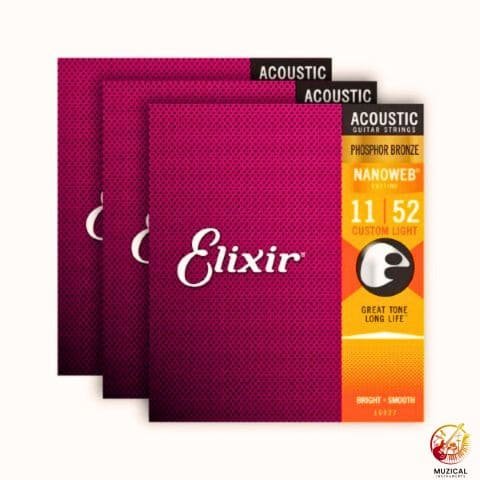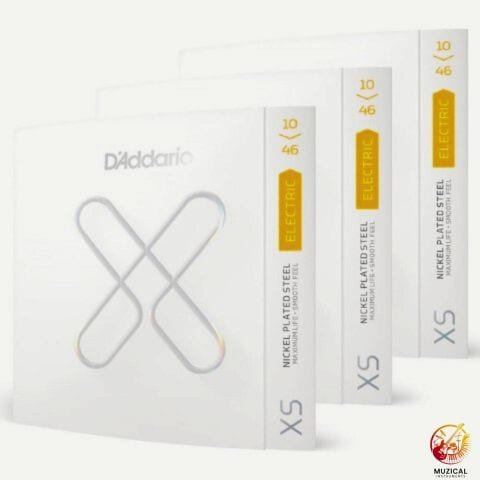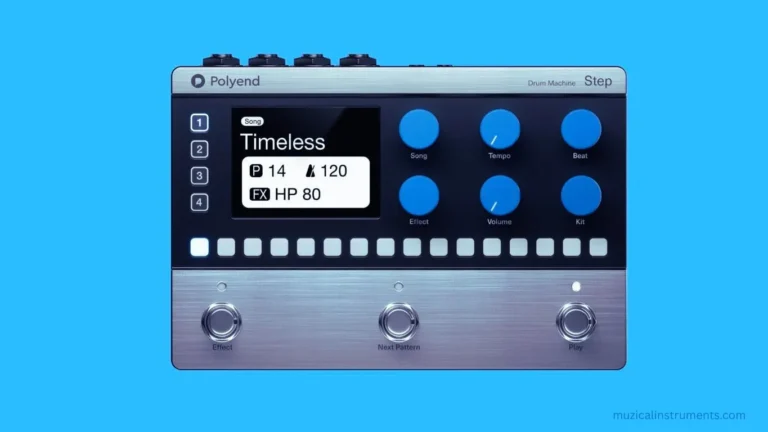What are the Benefits of Coated Guitar Strings?
If you play guitar, you know one of the biggest costs isn’t buying a new pedal. It’s the constant job of changing your strings. Many people who play often swap out their strings every month just to keep their guitar sounding fresh.
Coated guitar strings promise to break this cycle. The main benefits of coated guitar strings are they are built to last 3 to 5 times longer than standard uncoated strings and protects your strings from humidity, sweat, skin oil and dust.
This does more than just save you money; it can change the way you feel about playing your instrument.
In this guide, we will look at what makes these strings special. You will learn why they last so long and how they affect the sound and feel of your guitar. We’ll also see if paying more for them at the start is actually worth it.
We want to give you the simple facts so you can decide if coated strings are the right choice for you and your music.
How Exactly Do Coated Strings Fight Off Corrosion?

The biggest enemy of your guitar strings is actually your own hands. The sweat, oil, and dirt from your fingers get into the tiny grooves of the strings. This gunk causes the metal to rust and break down. As a result, your strings lose their bright, clear sound and can even start to feel rough.
Understanding this is the key to seeing the real benefits of coated guitar strings. They solve this problem by adding a super–thin protective layer. Think of this coating as a shield that blocks the gunk from your fingers from ever reaching the metal wire. This barrier keeps the string clean and stops it from rusting. A well-known company that perfected this technology is W. L. Gore & Associates, the makers of GORE-TEX fabric, who created the famous Elixir Strings.
There are two main ways this coating is applied.
- Coating the Wrap Wire: Some brands coat the outer wire before it is wrapped around the string’s center core. This makes the string feel more like a traditional, uncoated one. D’Addario’s XS series is a good example of this thin approach.
- Coating the Entire String: Other brands coat the whole string after it has been made. This technique seals the entire string, offering maximum protection. Elixir’s popular NANOWEB coating is very thin for a natural feel, while their original POLYWEB coating is thicker and feels much slicker to play.
This protective layer keeps the string clean, allowing it to vibrate freely and hold its great tone for much longer.
Do Coated Strings Feel and Sound Different?
One of the biggest questions people ask is if coated strings feel and sound different. The honest answer is yes, but it depends on the brand and the thickness of the coating.
Let’s talk about feel first. Early coated strings were known for being very smooth and slick. Some players loved this because it cut down on the squeaky noise when sliding their fingers on the fretboard, which is great for recording.
Other players missed the grip of a regular string. Today, technology has gotten much better. Modern coatings are incredibly thin, so they feel much more like normal strings, just with a smoother glide.
Now, for the sound. A regular uncoated string sounds very bright and “zingy” when new, but it loses that sparkle quickly. A coated string often sounds a little warmer right at the start, almost like it’s already been broken-in.
The crucial difference is that they keep their balanced, clear sound for months. This long-lasting, consistent tone is one of the biggest benefits of coated guitar strings.
Think of it this way: a regular string’s good tone is like a steep hill that you go down fast. A coated string’s tone is like a high, flat road that lets you cruise for a long time.
Pro Tip: If your hands have very sweaty palms that “kill” a set of strings in a week, coated strings are a must-have. The protective barrier will be a game-changer for you.
| Feature | Uncoated Strings | Thicker Coating (e.g., POLYWEB®) | Ultra-Thin Coating (e.g., NANOWEB®, D’Addario XS) |
|---|---|---|---|
| Initial Tone | Very Bright, “Zingy” | Warm, Broken-in | Bright, but slightly less “zing” than uncoated |
| Feel | Traditional, Grippy | Very Smooth, “Slick” | Smooth, but feels close to traditional |
| String Noise | High (squeaks) | Very Low | Low |
| Longevity | Short (1–4 weeks) | Very Long (3–6+ months) | Long (3–5 months) |
Are Coated Guitar Strings Worth the Higher Price Tag?
Let’s be clear: coated guitar strings cost more at first. A single pack can be double or even triple the price of a standard set of strings. This higher price often stops players from trying them. But to see their true value, you need to look at the total cost over time.


Here’s a simple breakdown. Imagine you like a fresh tone and change your strings once a month.
- Regular Strings (6 Months): A standard $6 pack bought each month would cost you $36. You would also spend time changing strings 6 times.
- Coated Strings (6 Months): A $15 pack of coated strings can easily last for 3 months. You would only need 2 packs, costing you $30. You would only change strings twice.
In this case, you not only saved $6, but you also saved yourself the trouble of four extra string changes. This ability to save you both money and, more importantly, time is one of the biggest benefits of coated guitar strings. That’s more time you can spend playing music instead of working on your gear.
This advantage is even bigger for people who own multiple guitars. Keeping fresh strings on all of them is a constant expense. With coated strings, you can leave a guitar in its case for weeks and know it will still sound fresh and be ready to play when you are.
| Cost Factor | Uncoated Strings (6-Month Period) | Coated Strings (6-Month Period) |
|---|---|---|
| Price per Pack (Avg.) | ~$6 | ~$15 |
| Changes Required | 6 (Once per month) | 2 (Once per 3 months) |
| Total String Cost | $36 | $30 |
| Time/Hassle Factor | High (6 full changes) | Low (2 full changes) |
| Verdict | Cheaper per pack, but more expensive and time-consuming over time. | Higher initial cost, but cheaper and more convenient in the long run. |
Who Should Use Coated Strings (And Who Might Not)?
Even with their advantages, coated strings aren’t the perfect choice for every single guitarist. Your style of music and what you personally like in a string will help you decide.
Let’s look at who will get the most out of the benefits of coated guitar strings.
- Musicians Who Play Live: For gigs, you need strings you can count on. Coated strings keep a consistent tone night after night and are less likely to break or sound dead mid-show.
- Anyone Recording Music: In the studio, less finger squeak is a huge plus. It leads to cleaner recordings and saves you time on editing.
- Hobby Players: If you only play once or twice a week, regular strings can go bad just from sitting in the case. Coated strings will be fresh and ready whenever you are.
- Players in Humid Places: In a humid place, the moist air can rust regular strings very quickly. The coating on these strings protects them from the air.
- Those with “Acidic” Sweat: If your hands tend to rust strings fast, the protective coating will feel like a miracle.
However, you might want to stick with regular strings if:
- You Want a “Vintage” Tone: Some players chasing a classic sound for blues or folk might feel the coating changes the tone in small ways. They may prefer the raw sound of an uncoated string.
- You Like the Feel of Worn-In Strings: Some people like the warmer, mellower sound of strings that have been played for a few weeks. Coated strings take much longer to get to that point.
- You’re on a Tight Budget: While they can save you money over time, the higher price for a single pack can be tough if you can only spend a little right now.
Ultimately, there is no right or wrong answer. You have to weigh the trade-offs and decide what matters more to you.
Final Thoughts: Is It Time for You to Make the Switch?
So, the main benefits of coated guitar strings are clear. They last much longer, keep a good, consistent tone, feel smooth to play, and can save you both time and money.
Today’s coated strings have improved a lot. Old complaints about them feeling “weird” or sounding “dead” are mostly a thing of the past. Modern sets from brands like Elixir and D’Addario feel and sound very natural. They offer a great solution to rusty strings for almost any player, especially in humid places.
The best way to know if they’re right for you is to simply try a set. Next time your guitar needs new strings, pick up a coated pack. Pay attention to how they feel and sound over the next few weeks. You might find their long-lasting, great tone is exactly what you’ve been looking for.
Once you know how coated strings work, it’s easier to choose the best guitar strings for your needs based on tone, feel, and durability.
FAQ: Benefits of Coated Guitar Strings
Q1. How long do coated strings actually last?
This is the most common question, and the answer is: it depends, but always much longer than uncoated strings. For most players, a set of coated strings will last 3 to 5 times longer. If you play every day, you might get several months of great tone instead of just a few weeks. If you play less often, a set can last for over six months. Here in Chattogram, where the high humidity can rust regular strings very quickly, coated strings are a huge help and can easily last for many months.
Q2. Do coated strings break more easily?
No, this is a common myth. The coating is a micro-thin layer that protects the string from dirt and rust; it doesn’t make the string weaker. A string’s strength comes from its metal core wire. If your strings are breaking, it’s usually due to other issues like a sharp saddle on your bridge or very aggressive playing, not because of the coating.
Q3. Can you clean coated strings?
Yes, and it’s very simple. The best way to clean coated strings is to just wipe them down with a dry, clean cloth after you finish playing. This removes any surface sweat or oils. You should avoid using liquid string cleaners, as some of the chemicals could damage the thin coating over time. The good news is the coating is already doing most of the work to keep gunk out of the windings.
Q4. Are coated strings a good choice for beginners?
They are an excellent choice for beginners. First, the smoother feel can be a little easier on new, uncalloused fingertips. Second, they reduce finger squeak, which helps a new player hear the notes they’re playing more clearly. Finally, because they last so long, beginners can focus more on learning and practicing and less on gear maintenance like changing strings.
Q5. Do they make coated strings for electric and bass guitars too?
Absolutely. While we often talk about them for acoustic guitars, all the same benefits apply to electric and bass guitars. Coated electric strings stay bright and snappy for much longer, which is great for rock and pop music. For bass players, a coated set can keep the deep, clear tone alive for months, preventing that dull, thuddy sound that dead bass strings get. Major brands like Elixir, D’Addario, and Ernie Ball all make coated versions for electric and bass guitars.




